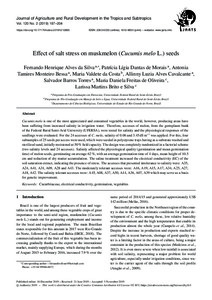Datum
2019-12-16Autor
Silva, Fernando Henrique Alves daMorais, Patrícia Lígia Dantas deBessa, Antonia Tamires MonteiroCosta, Maria Valdete daCavalcante, Allinny Luzia AlvesTorres, Salvador BarrosOliveira, Maria Daniela Freitas deSilva, Larissa Martins Brito eSchlagwort
630 Landwirtschaft, VeterinärmedizinMetadata
Zur Langanzeige
Aufsatz

Effect of salt stress on muskmelon (Cucumis melo L.) seeds
Zusammenfassung
Cucumis melo is one of the most appreciated and consumed vegetables in the world, however, producing areas have been suffering from increased salinity in irrigation water. Therefore, accesses of melon, from the germplasm bank of the Federal Rural Semi-Arid University (UFERSA), were tested for salinity and the physiological responses of the seedlings were evaluated. For the 24 accesses of C. melo, salinity of 0.06 and 3.45 dS m-1 was applied. For this, four subsamples of 25 seeds per access were used, which were seeded in polystyrene trays having as a substrate washed and sterilized sand, initially moistened at 50% field capacity. The design was completely randomized in a factorial scheme (two salinity levels and 24 accesses). Salinity affected the physiological quality (germination and mean germination time) of melon seeds, germinating on average 62%, with an average germination time of 4 days, mean height of 10.5 cm and reduction of dry matter accumulation. The saline treatment increased the EC of the soil saturation extract, indicating the presence of stress. The accesses that presented intolerance to salinity were: A35, A24, A41, A31, A09, A28 and A43. The moderately tolerant accesses were: A16, A19, A15, A17, A34, A25, A27, A18, A42. The salinity tolerant accesses were: A45, A08, A37, A50, A14, A36, A07, A39 which may serve as a basis for genetic improvement.
Zitierform
In: Journal of Agriculture and Rural Development in the Tropics and Subtropics (JARTS) Vol. 120 / No. 2 (2019-12-16) , S. 197-204 ; ISSN 2363-6033Zusätzliche Informationen
Gedruckte Ausg. im Verlag Kassel Univ. Press (www.upress.uni-kassel.de) erschienen.Sammlung(en)
Vol 120, No 2 (2019) (Journal of Agriculture and Rural Development in the Tropics and Subtropics (JARTS))Zitieren
@article{doi:10.17170/kobra-20191212865,
author={Silva, Fernando Henrique Alves da and Morais, Patrícia Lígia Dantas de and Bessa, Antonia Tamires Monteiro and Costa, Maria Valdete da and Cavalcante, Allinny Luzia Alves and Torres, Salvador Barros and Oliveira, Maria Daniela Freitas de and Silva, Larissa Martins Brito e},
title={Effect of salt stress on muskmelon (Cucumis melo L.) seeds},
journal={Journal of Agriculture and Rural Development in the Tropics and Subtropics (JARTS)},
year={2019}
}
0500 Oax 0501 Text $btxt$2rdacontent 0502 Computermedien $bc$2rdacarrier 1100 2019$n2019 1500 1/eng 2050 ##0##http://hdl.handle.net/123456789/11406 3000 Silva, Fernando Henrique Alves da 3010 Morais, Patrícia Lígia Dantas de 3010 Bessa, Antonia Tamires Monteiro 3010 Costa, Maria Valdete da 3010 Cavalcante, Allinny Luzia Alves 3010 Torres, Salvador Barros 3010 Oliveira, Maria Daniela Freitas de 3010 Silva, Larissa Martins Brito e 4000 Effect of salt stress on muskmelon (Cucumis melo L.) seeds / Silva, Fernando Henrique Alves da 4030 4060 Online-Ressource 4085 ##0##=u http://nbn-resolving.de/http://hdl.handle.net/123456789/11406=x R 4204 \$dAufsatz 4170 7136 ##0##http://hdl.handle.net/123456789/11406
<resource xsi:schemaLocation="http://datacite.org/schema/kernel-2.2 http://schema.datacite.org/meta/kernel-2.2/metadata.xsd"> 2019-12-19T16:31:01Z 2019-12-19T16:31:01Z 2019-12-16 doi:10.17170/kobra-20191212865 http://hdl.handle.net/123456789/11406 Gedruckte Ausg. im Verlag Kassel Univ. Press (www.upress.uni-kassel.de) erschienen. eng Urheberrechtlich geschützt https://rightsstatements.org/page/InC/1.0/ Cucurbitaceae electrical conductivity germination vegetables 630 Effect of salt stress on muskmelon (Cucumis melo L.) seeds Aufsatz Cucumis melo is one of the most appreciated and consumed vegetables in the world, however, producing areas have been suffering from increased salinity in irrigation water. Therefore, accesses of melon, from the germplasm bank of the Federal Rural Semi-Arid University (UFERSA), were tested for salinity and the physiological responses of the seedlings were evaluated. For the 24 accesses of C. melo, salinity of 0.06 and 3.45 dS m-1 was applied. For this, four subsamples of 25 seeds per access were used, which were seeded in polystyrene trays having as a substrate washed and sterilized sand, initially moistened at 50% field capacity. The design was completely randomized in a factorial scheme (two salinity levels and 24 accesses). Salinity affected the physiological quality (germination and mean germination time) of melon seeds, germinating on average 62%, with an average germination time of 4 days, mean height of 10.5 cm and reduction of dry matter accumulation. The saline treatment increased the EC of the soil saturation extract, indicating the presence of stress. The accesses that presented intolerance to salinity were: A35, A24, A41, A31, A09, A28 and A43. The moderately tolerant accesses were: A16, A19, A15, A17, A34, A25, A27, A18, A42. The salinity tolerant accesses were: A45, A08, A37, A50, A14, A36, A07, A39 which may serve as a basis for genetic improvement. open access Silva, Fernando Henrique Alves da Morais, Patrícia Lígia Dantas de Bessa, Antonia Tamires Monteiro Costa, Maria Valdete da Cavalcante, Allinny Luzia Alves Torres, Salvador Barros Oliveira, Maria Daniela Freitas de Silva, Larissa Martins Brito e publishedVersion ISSN 2363-6033 No. 2 Journal of Agriculture and Rural Development in the Tropics and Subtropics (JARTS) 197-204 Vol. 120 </resource>
Die folgenden Lizenzbestimmungen sind mit dieser Ressource verbunden:
Urheberrechtlich geschützt

